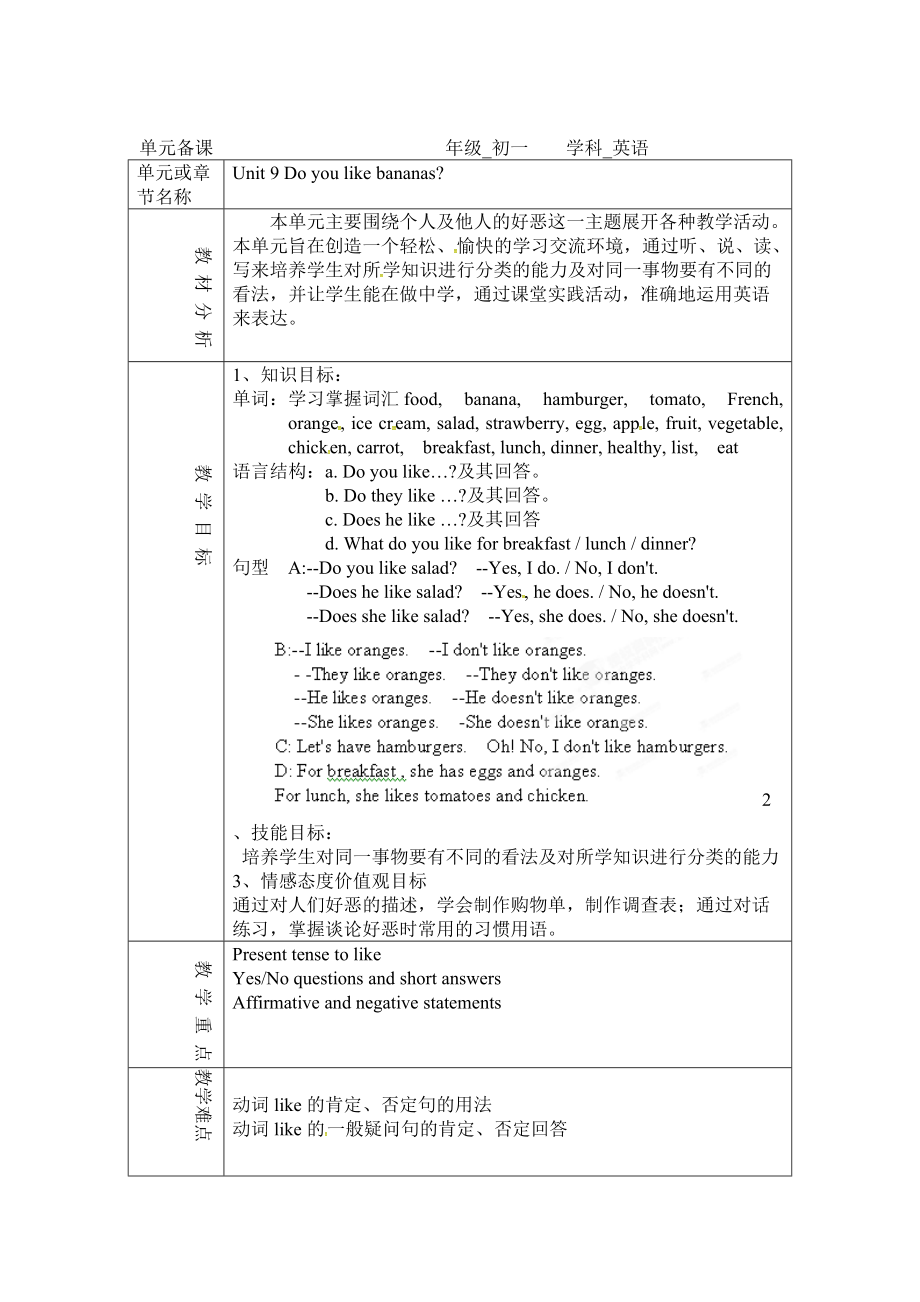《【魯教版】英語六年級上冊:Unit 9Do you like bananas全單元備課教案》由會(huì)員分享���,可在線閱讀���,更多相關(guān)《【魯教版】英語六年級上冊:Unit 9Do you like bananas全單元備課教案(2頁珍藏版)》請?jiān)谘b配圖網(wǎng)上搜索。
1����、 精品資料
單元備課 年級_初一 學(xué)科_英語
單元或章節(jié)名稱
Unit 9 Do you like bananas?
教 材 分 析
本單元主要圍繞個(gè)人及他人的好惡這一主題展開各種教學(xué)活動(dòng)。本單元旨在創(chuàng)造一個(gè)輕松�����、愉快的學(xué)習(xí)交流環(huán)境���,通過聽���、說、讀���、寫來培養(yǎng)學(xué)生對所學(xué)知識(shí)進(jìn)行分類的能力及對同一事物要有不同的看法����,并讓學(xué)生能在做中學(xué)���,通過課堂實(shí)踐活動(dòng)���,準(zhǔn)確地運(yùn)用英語來表達(dá)。
教 學(xué) 目 標(biāo)
1�����、知識(shí)目標(biāo):
單詞:學(xué)習(xí)掌握詞匯food, b
2�����、anana, hamburger, tomato, French, orange, ice cream, salad, strawberry, egg, apple, fruit, vegetable, chicken, carrot, breakfast, lunch, dinner, healthy, list, eat
語言結(jié)構(gòu):a. Do you like…?及其回答����。
b. Do they like …?及其回答。
c. Does he like …?及其回答
d. What do you like for breakfast / lunch / dinner?
句型
3���、 A:--Do you like salad? --Yes, I do. / No, I don't.
--Does he like salad? --Yes, he does. / No, he doesn't.
--Does she like salad? --Yes, she does. / No, she doesn't.
2���、技能目標(biāo):
培養(yǎng)學(xué)生對同一事物要有不同的看法及對所學(xué)知識(shí)進(jìn)行分類的能力
3�����、情感態(tài)度價(jià)值觀目標(biāo)
通過對人們好惡的描述����,學(xué)會(huì)制作購物單����,制作調(diào)查表;通過對話練習(xí)���,掌握談?wù)摵脨簳r(shí)常用的習(xí)慣用語����。
教 學(xué) 重 點(diǎn)
Present tense
4�����、 to like
Yes/No questions and short answers
Affirmative and negative statements
教學(xué)難點(diǎn)
動(dòng)詞like的肯定���、否定句的用法[
動(dòng)詞like的一般疑問句的肯定�����、否定回答
教學(xué)方法
1.本單元的話題與學(xué)生的生活聯(lián)系緊密�����,基于此����,創(chuàng)設(shè)生活化的真實(shí)情景���,引導(dǎo)學(xué)生在語言學(xué)習(xí)中學(xué)習(xí)語言���,然后再創(chuàng)造性地使用。
2.開展多種活動(dòng)���,給學(xué)生充分的交流空間�����,加強(qiáng)學(xué)生間的合作學(xué)習(xí)���,并引導(dǎo)學(xué)生進(jìn)行探究學(xué)習(xí)����。
學(xué)生情況分析
本單元的主題是談?wù)撓矚g和不喜歡的食物�����,學(xué)生可以采用Personalizing和
5�����、Classifying的學(xué)習(xí)策略���,學(xué)習(xí)新詞匯����,掌握重點(diǎn)句型���,同時(shí)能比較好地解決類似問題����,既能鞏固所學(xué)知識(shí)���,又能提高解決問題的能力以及綜合運(yùn)用語言能力����。
單元學(xué)科知識(shí)體系構(gòu)建
2 課時(shí)分配
The First Period: Section A 1a - 2c
The Second Period: Section A 2d – 3c
The Third Period : Section B 1a – 1e
The Fourth Period: Section B 2a-2c
The Fifth Period: 3a- selfcheck
The Sixth Period: Revision
最新精品英語資料
 【魯教版】英語六年級上冊:Unit 9Do you like bananas全單元備課教案
【魯教版】英語六年級上冊:Unit 9Do you like bananas全單元備課教案

